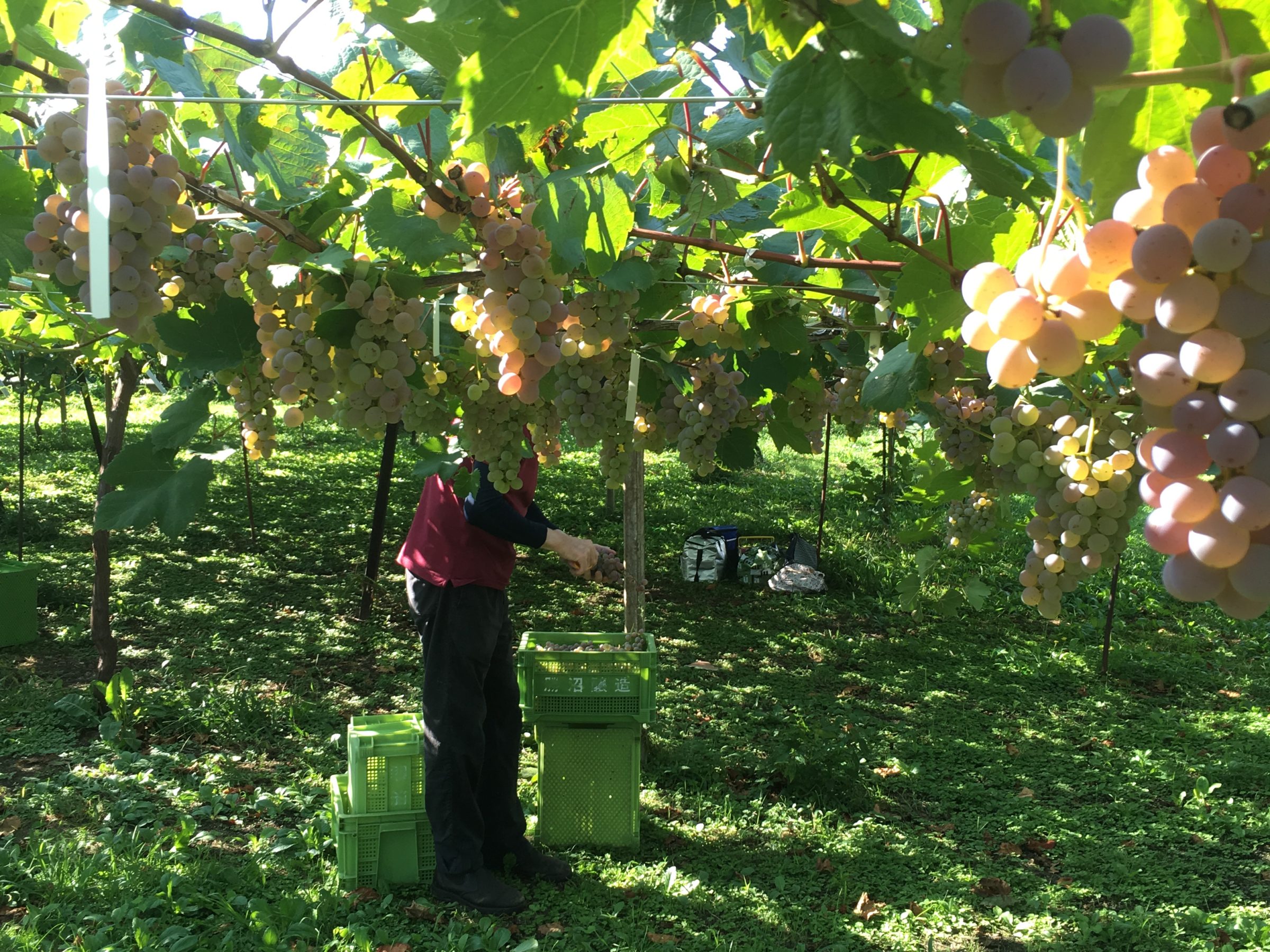The Shimora Koshu Project.
This is a project of husband and wife team, Phillip Moraghan and Dr. Rika Shimo-Moraghan, with their Shimora brand coming from a comingling of their family names.
For the past four years the couple has been spending the northern hemisphere vintage at Katsunuma Jozo winery, in Katsunuma, Yamanashi prefecture. With Rika needing winery experience, as required by her winemaking studies, and Phillip wanting to work outside his comfort zone of Pinot Noir and Chardonnay, the couple thought Germany would be an interesting place to do vintage, but realised that language would make the learning experience very difficult. So it was decided to go to Japan and although Phillip is only now learning Japanese, with Rika being a simultaneous interpreter there would be very little language barriers.
Through Japanese friends, Mr Kenichi Ohashi MW and Makoto Inamasu of INU wines in Fukuoka, they were introduced to Yuki Hirayama, then the Head Winemaker at Katsunuma Jozo. The winery is owned by the Aruga family and was founded by the current CEO’s father in 1937. It is one of the leading premium wine producers of Japan, with an annual crush of 400 tonnes (30,000 cases), three quarters of which is Koshu. The three sons of the CEO work in the business; Hiro, who trained in Burgundy, has taken over as Chief Winemaker, Sho is the viticulturist and Jun is in marketing and sales.
2014 was the couple’s first year at Katsunuma Jozo, and while there was some questioning as to why Phillip wasn’t in Burgundy and did the couple have a real interest in working with Japanese varieties, they were soon adopted into the winery team and the family. After a week or so, and having tasted many of the wines from Curly Flat, it was decided that four tonnes of their best Koshu fruit would be set aside to see what Phillip and Rika would do with it.
Although not departing significantly from how the winery normally processed Koshu, Phillip and Rika did do a number of things differently. One of these was based on some trials the winery had already done, but was not using regularly and that was putting the freshly pressed juice in new oak and putting the barrels in the cool room so as to prevent an active ferment, and after five days transferring the juice to a stainless steel tank for fermentation. Rika and Phillip refer to this practice as “the kiss of oak” as it adds a very subtle oak tone to the finished wine. They also used the much gentler approach of whole bunch pressing, rather than the more mechanical approach of destemming before pressing. Further, they inoculated with yeasts developed by the Australian Wine Research Institute specifically for aromatic white wines.
The couple returned home convinced that Koshu could have a place in the future Australian wine industry, particularly with its capacity to ripen at lower potential alcohol levels and given its ability to match to Japanese cuisine, which is becoming increasingly adopted around the world. With this in mind, they arranged to import some Koshu cuttings into Australian Customs Biosecurity Quarantine for future planting. It is unfortunate that all their attempts to import Japanese varieties has yet to produce any positive results as the plants have been found to have particular viruses and subsequently have been destroyed
It was after they returned to Australia that they were contacted by the winery and it was suggested that they should start their Koshu project by importing some of the wine they made and it was requested that they return again for the next vintage to repeat the project.
In their last two vintages at Katsunuma Jozo they have been actively involved in assisting Hiro take over the role as Chief Winemaker, and together with Hiro have introduced several new winery practices including longer press cycles and new fining/clarifying approaches.
In September they depart for their seventh vintage.
The future
In October 2017, Phillip sold his half interest in Curly Flat as part of a long overdue divorce settlement. In November 2018, Phillip and Rika found their dream home/vineyard/winery site in Little Hampton, Trentham, Victoria. The 32 hectare site, which had been grazing sheep, with the rich, red soils of the potato growing capital, Trentham, is situated at an altitude of 750 metres at the highest point, with the lower, west side facing the Wombat forest.
The main focus of the new vineyard will be Pinot Noir but the couple are hoping that their efforts to bring Japanese varieties will eventually see some virus free Koshu vines and Muscat Bailey A vines cleared by Border Control and planted in their new vineyard. At this stage there are only two plantings of Koshu outside of Japan, those being Germany and France, and all are small producers. Currently, they are looking for ways to get tissue cultured Koshu and Muscat Bailey A to Australia.


